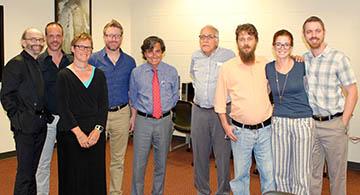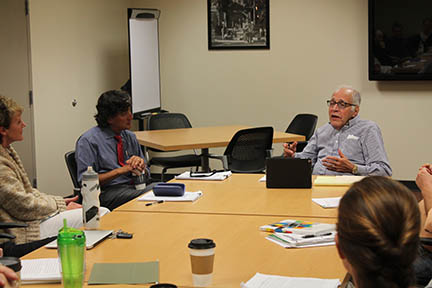Guest seminar addresses the notion of “hate” with social work faculty and students

A group of FSU College of Social Work students and faculty enjoyed a transdisciplinary conversation and seminar on the topic of hate. Dr. Lawrence (Larry) J. Friedman, currently a teacher at Harvard University and an emeritus professor of history and philanthropic studies from Indiana University, led the discussion. Dr. Friedman’s extensive research, publication, and teaching record in the areas of violence, racism, antislavery, and social activism provided a unique opportunity for the College’s social work faculty and students to explore the concept of hate from a historical perspective while addressing currently pertinent national issues of social conflict and racial tension. Doctoral Student Daniel (Dan) Dunleavy reflects on this unique opportunity.
Reflections on Professor Friedman’s Seminar
Seminars are a great way to engage with a writer or researcher to whom you might not otherwise be exposed. These intimate settings provide an opportunity to learn about new topics, ask questions, and to be exposed to a wide range of viewpoints and arguments. Recently, professor Larry Freidman came to our College to discuss his forthcoming manuscript Why We Hate.
About a week before the seminar all participants had the opportunity to read a draft of the manuscript and orient ourselves to Professor Friedman’s argument and overall approach to the topic. Why We Hate confronts many of the most horrifying episodes of violence and hatred inflicted upon mankind by mankind, while describing and contrasting various explanations and accounts as to why such hateful and violent behaviors persist even today. The manuscript was particularly interesting for me, in that it not only discussed the topic from a historical perspective, but advanced discourse on the subject in what felt like a more constructive and productive direction. Additionally, it exposed me to a variety of authors and views that I was unfamiliar with, such as the works of Franz Fanon and Iris Chang.

The seminar itself included a stimulating discussion centered on the topic of hate and the variety of theories and views that have been offered to explain its existence and continued proliferation worldwide. Hate was discussed through the universalistic lenses of Karl Marx and Emil Durkheim, the particularist frameworks of Philip Zimbardo and Stanley Milgram, and the blended perspectives of Hannah Arendt and Erik Erikson, among others. Universalist accounts typically attempt to provide explanations for hate that are grounded within human nature. For instance, Sigmund Freud proposed that social unrest and violence was rooted in the psychological tension and conflict inherent to the human condition. Particularist accounts generally attempt to ground the phenomenon of hate within the context of a specific time and place. For example, psychologist Philip Zimbardo describes how a generally ethical person can be transformed into an abusive oppressor, as exemplified in the case of a few military policemen charged with running the Abu-Ghraib prison in Iraq, whose aggressive conduct did not match their civilian histories. Blended perspectives, such as those of Hannah Arendt attempt to merge the complementary aspects of these traditionally divergent perspectives. Professor Friedman used his vast historical knowledge and experience to guide us and provided the faculty and students in attendance the opportunity to engage with, reflect upon, and challenge these explanations for hate. For example, Dr. Tomi Gomory and Professor Friedman were able to find similarities and differences in their views on human behavior and personal responsibility, specifically as it related to hateful actions; while Dr. Philip Osteen and Professor Friedman grappled with the possibility of a “banality of altruism”, in juxtaposition to Hannah Arendt’s famous “banality of evil”.
Professor Friedman’s laid-back, but attentive and thoughtful demeanor made our conversation very enjoyable. He helped to create a comfortable environment allowing for an open dialogue among the seminar participants. Why We Hate, among Professor Friedman’s other work should be of particular interest to any social worker concerned with the problems of social conflict and unrest (including war, gun violence, crime, and tension between and among various racial/ethnic groups.)
This event provided an engaging and important topic discussion with someone who is clearly an expert on a subject that is not generally or explicitly covered in social work education. My thanks to Dean Jim Clark for putting this together and for Professor Friedman for taking the time to come speak with us. I hope we have more speakers like him visit the FSU College of Social Work in the near future.

